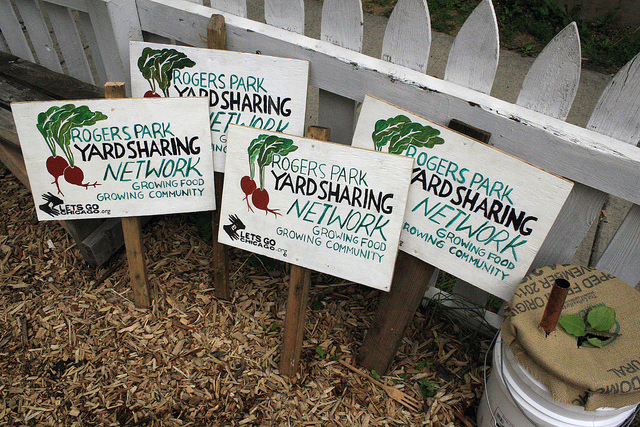Yard Sharing Gains Ground In Rogers Park
By Staff in Food on Jun 13, 2014 4:30PM
When you moved into your home, did you look out across your backyard and imagine grilling for all your friends on your hypothetical grill? Lazy afternoons on your hypothetical hammock? Rowdy games of badminton, where you’d finally show the world your hypothetical mad skillz? If you’ve failed to actualize and your lawn has become a treacherous Jumanji-scape from disuse, it might be time to consider sacrificing your yard to a higher purpose.
Last year, one backyard in Rogers Park produced over 1,000 pounds of produce. That yard is part of Rogers Park Yard Sharing Network, a project that connects capable gardeners with homeowners who don’t use their yards.
The yard sharing network started small, in 2011. A neighbor of LETS GO Chicago, a youth-led garden program headquartered in Rogers Park, offered up his unused lawn, and program leaders saw a unique opportunity to bring some benefits of an agricultural infrastructure to a neighborhood with no available land.
“We love Rogers Park, but it’s one of the most compact neighborhoods and we have almost no vacant land,” said program leader Molly Costello, “There is still underutilized land, but it might be on private property.”
In 2012, after the success of the lawn sharing network’s pilot garden, LETS GO Chicago members went door-to-door in Rogers Park in search of homeowners willing to volunteer their lawns. “Plenty of people were like, ‘uh, no, that’s my yard,’” Costello said, but they did find four more homeowners interested in re-appropriating their lawns.
Now the network includes seven front and backyards, which are maintained by volunteers. Costello has high hopes for urban farming as a small solution to Chicago’s food crisis, but she has also enjoyed the sense of community that gardening has built in one of Chicago’s most diverse neighborhoods.
“In a backyard garden a few weeks ago, there was a gap in the fence where people can see in, and a woman connected with a church down the street came in. She was pointing at the plots and herself, saying, ‘me, me.’” The woman was Tanzanian and she spoke very little English, so her daughter came in and told Costello that her mother wanted a plot. “There are barriers, like language, that might keep people out of gardening projects elsewhere,” Costello said.
The program has a sliding, “pay what you can” fee for using plots, and startup and maintenance costs don’t fall to homeowners unless they want to donate. LETS GO Chicago provides a 10-page toolkit for people interested in starting yard sharing networks in other neighborhoods, including links to land use agreements and scripts for going door-to-door.
A solution to the food crisis, a community-building tool, and a salve for your yard shame? Sign me up.
By Lauren Larson.
